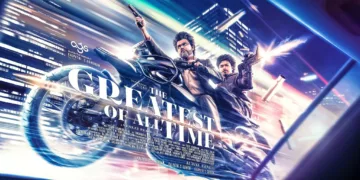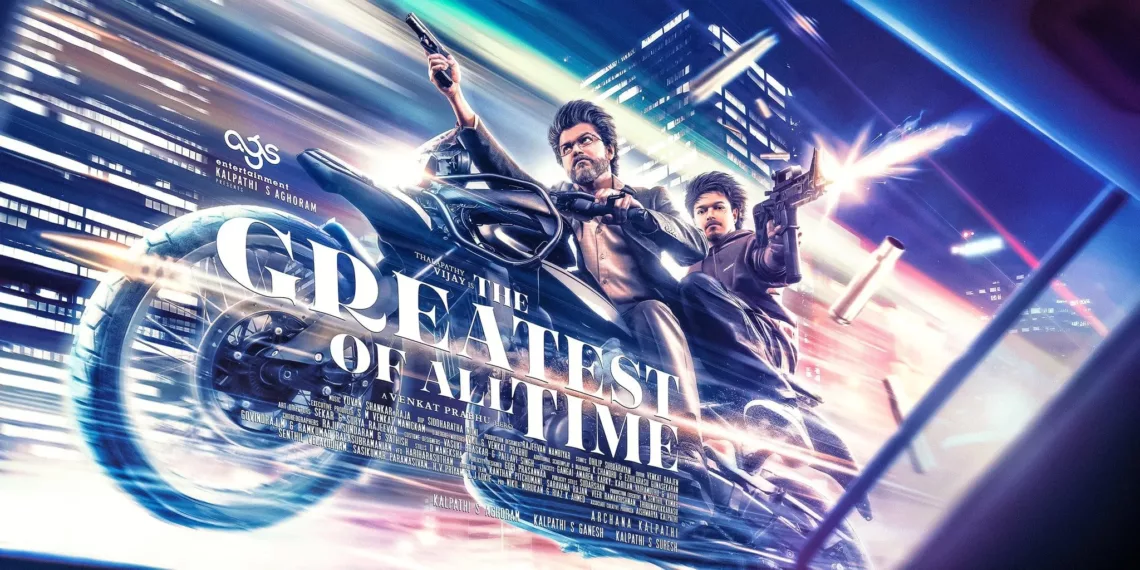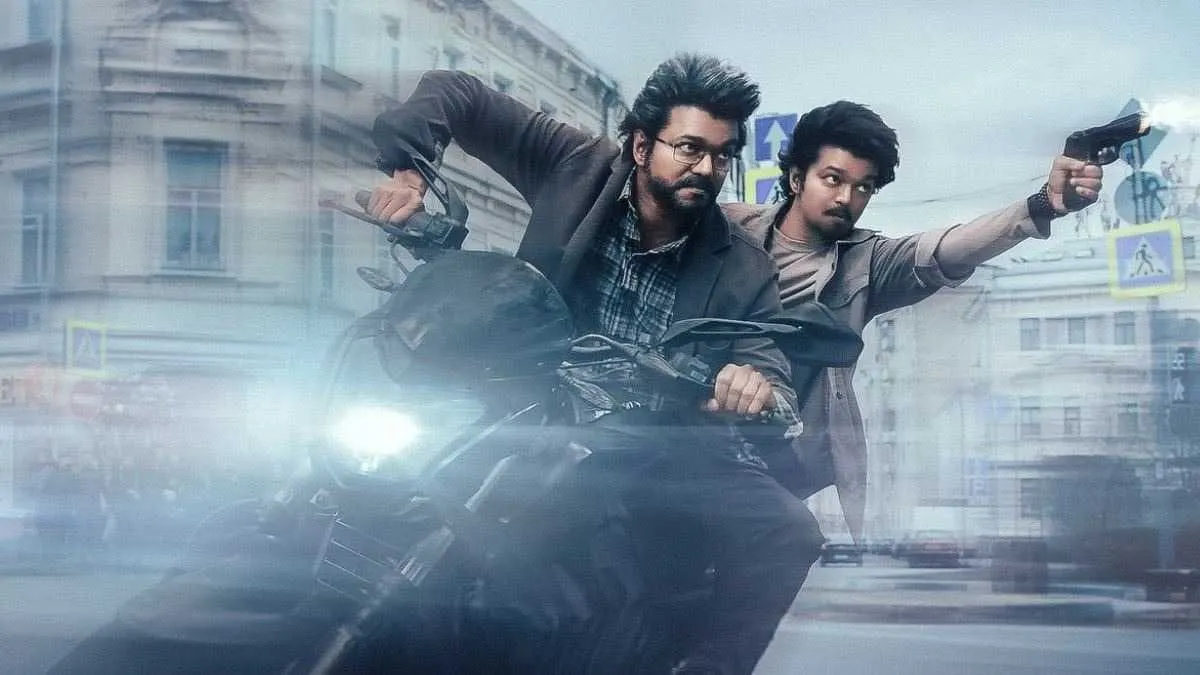Venkat Prabhu brings actor Vijay together in The Greatest of All Time, their fifth collaboration over Vijay’s decades-long career. Fans know Prabhu for injecting comedy and heart into his films, and Vijay as one of Tamil cinema’s most beloved stars. This time, they take on Vijay’s most ambitious role yet—playing dual parts as father and son on screen.
Vijay portrays M.S. Gandhi, a respected spy in India’s Special Anti-Terrorism Squad. As a family man with a wife and young son, Gandhi’s life is doubled between dangers on the job and duties at home. But tragedy soon strikes, separating Gandhi from his family for years. When a grown son unexpectedly reappears, Gandhi must rediscover their relationship while threats from the past reemerge.
Through this storyline, Vijay undertakes the challenge of becoming two different characters inhabiting one body. Prabhu aims to showcase new sides of Vijay’s abilities after decades of winning fans’ hearts. The film also reunites many in Vijay’s regular crew to bring this complex tale to life. With Vijay’s dedication and Prabhu’s vision teaming up once more, supporters look forward to seeing this star push boundaries in The Greatest of All Time.
Vijay takes on a double challenge
The film begins by introducing us to M.S. Gandhi, an elite agent working with India’s Special Anti-Terrorism Squad. Gandhi finds himself in the midst of a daring mission in Kenya, doing what he does best—tackling danger with courage and ease. We also meet his loving family at home, consisting of his wife Anu and their young son Jeevan.
But shadows soon fall over Gandhi’s life. On a fateful work trip, his family meets grave misfortune. Jeevan is captured by unknown threats and believed dead after tragic events unfold. Gandhi’s world turns upside down overnight. He separates from Anu in grief, forced to leave behind his life’s purpose in the field.
Time jumps ahead over a decade and a half. Gandhi now works an office job, still haunted by his past. Meanwhile, Jeevan mysteriously re-emerges during a volatile incident abroad. In a twist, he reunites with his father after all these years, though questions remain over Jeevan’s intentions. Gandhi seeks to reconnect with the son he lost, uncovering dark truths along the way.
It is here that Vijay embraces an ambitious double role. He breathes life into both Gandhi and the adult Jeevan, crafting two unique characters from the same man. As a seasoned agent and then a father striving to understand his estranged son, Vijay’s nuanced performances hold the story together. Through this plot device and Vijay’s skills, the film explores complex themes of loss, family, and changing identities over time.
While predictable in parts, the double role allows fans to admire Vijay’s dedication to his craft anew. He illuminates the human sides of good and troubled characters alike, showing rivals can emerge from loved ones. If nothing else, Vijay’s performance makes for an engaging centerpiece in this tale of mysteries from the past catching up to the present.
Exploring Story and Style
Director Venkat Prabhu took on the ambitious task of crafting an action thriller around Vijay’s dual roles. So how did he handle the pressure of the genre and this celebrated artist?
Prabhu kickstarted the film with promise, opening on Gandhi’s riveting mission abroad. The train scene set an engaging tone and showed skill with pace. However, momentum was lost afterwards. Predictability set in quick, with even major “twists” telegraphed far before arrival.
While characters like Gandhi started vividly, the writing did them few favors. Story beats like Anu’s suspicions felt lazy rather than meaningful. More depth could have amplified tension between family and foes. As secrets unwound in plot twists, audiences disengaged instead of leaning forward.
True edge-of-seat potential existed. Gandhi pursuing shadows from his past could have thrilled. But execution let potential down. Action fell flat through choppy edits and special effects failing to enhance brute force. Music swelled at odd times versus lifting peril.
Venkat Prabhu is blessed with Vijay’s finesse, yet seemed unsure how best to challenge this performer. Flashes of emotional nuance came through but got buried under heavy-handed story telling. The director grasped action basics yet fumbled raising stakes throughout a lengthy runtime.
With a clear vision, Prabhu may have gripped viewers and done Vijay’s skills more justice. But ambition outpaced follow-through. While leveraging Vijay’s star power, the director also stifled his abilities through an unfocused story and genre missteps. More caressing moments could have made this thriller truly unmissable.
Evaluating the Visual Elements
Cinematography helped establish Vijay’s missions vividly, from the thrilling train start to glimpses of bustling cities. While everyday scenes lacked pop, fight choreography stood out through lively camerawork.
Art direction felt timely, from traditional family interiors to political rallies’ chaotic textures. Costuming evoked eras’ espionage cool or civilians’ lived-in layers. Make-up transformed Vijay convincingly yet comfortably between roles.
Sadly, editing let visuals down. Momentum vanished under choppy cutting during actions and VFX-led climaxes. Transitions rarely absorbed audiences fully into new settings before scenes concluded. Pacing issues arose.
Music aimed to elevate drama but missed the mark. Yuvan Shankar Raja’s compositions suited neither tones nor timings consistently. Outside “Matta,” his work acted as a barrier instead of an enhancement.
Meanwhile, de-aging left Vijay’s dual role performances untouched in believability and emotion. VFX erased years without distracting from his talents. But visual spectacle fell flat elsewhere through special effects’ shortcomings.
While craft elements created a feasible basis, inconsistency stopped them fulfilling potential. With surer technical orchestration, finer details may have heightened the overall movie-watching experience immensely. Instead, imperfections disrupted engaging with The Greatest of All Time’s story on its fullest terms.
Evaluating the Performances
Vijay, as Gandhi and Jeevan showcased his commitment through seamless de-aging. As a father losing his family, grief felt raw. Intensity grew when confronting threats to it. As the conflicted son, contradictions emerged clearly through eyes conveying hurt over actions. Nuances between the complex characters stood out.
Sneha, opposite Vijay, delivered the heart. Her worry for a missing spouse and child’s sorrow felt grounded. Supporting cast added flavors too. Prabhu Deva and Prashanth built laughs as squadmates behind tough exteriors. Jayaram leading them acted as assurance in hardship.
Yet not all characters left their mark. Writers crafted family drama broad instead of profound. Meenakshi and Abhiyuktha playing wife and daughter stayed surface level. Potential for depth existed but remained untapped. Likewise, villain Mohan lacked staying power over a crowded cast.
Potential stood where complexity could have flourished. Dynamics between good and bad holding secrets stirred intrigue. But narrative prioritized predictable plot over character study. More investing in their interior lives might have amplified stakes across this epic runtime.
As it were, Vijay’s efforts alone salvaged a story that sidelined castmates. Through him, glimpses emerged of moving characters within reach. Had scripts favored psychology as much action, Tamil cinema may have gained nuanced drama for the genre.
Rating The Greatest of All Time
When considering The Greatest of All Time as a complete package, the hits and misses balance out to a middle-of-the-road rating. Prabhu displays flashes of directorial flair, but his execution lacks consistency. The script entertains in spots yet fails to sustain momentum. Technical pieces bring settings to life but cut themselves short.
Vijay’s efforts alone lift the film to a watchable level. Through his dynamic dual performance, souls emerge from stock roles. Had other talents received his level of care, strengths may have shone brighter. As is, Vijay earns this three-star film a rating.
For diehard Vijay fans wanting to analyze every nuance, his work merits attention. Those curious about his acting range also gain insights. Yet casual viewers may find moments overwhelming an otherwise predictable story. Young fans attracted by glitz risk boredom from redundant drama.
Ultimately, this felt like a missed opportunity to celebrate a superstar through fine cinema. More depth to its people and their interplay could have thrilled. As an enjoyable curiosity for Vijay loyalists, The Greatest of All Time stands. But it falls short of greatness, with room left for its stars to shine brighter. A solid three out of five feels like a fitting score.
Evaluating the Whole Experience
So in wrapping up, The Greatest of All Time landed somewhere in the middle for me overall. Vijay delivered as always, bringing his usual talent and care. But inconsistencies let down other areas that could have made the film truly shine.
The plot had its thrilling moments, yet fell back on tired tropes too often. Technical aspects created solid foundations at times, then faltered where continuity mattered most. Characters flashed potential for depth that went unfulfilled.
Still, any Vijay vehicle remains watchable thanks to his charisma and commitment. For diehard fans or those curious about his range, glimpses of drama and action may prove worthwhile. Yet casual viewers seeking tighter storytelling risk losing focus.
In the end, a rating of three out of five stars feels accurate, showcasing flashes of quality amid room for improvement. With luck, Vijay’s future projects grant him opportunities to stretch even further. Until then, I wish him the best as he wraps up an iconic career.
To all readers, thank you for joining me in exploring this latest chapter featuring one of India’s most celebrated stars. I hope you found the review informative as you consider adding The Greatest of All Time to your watch list. Until next time!
The Review
The Greatest of All Time
The Greatest of All Time had flashes of entertainment value but ultimately lacked the polish and progression needed to fulfill its potential. Vijay's commendable commitment to his dual role keeps the film engaging at times. However, inconsistent writing and execution of other elements undermine fully drawing viewers in.
PROS
- Vijay's committed dual performance
- Glimpses of nuanced drama through father-son storyline
- Production values and set pieces at times
CONS
- Predictable and drawn-out plotline
- Inconsistent direction and execution of scenes
- Underdeveloped supporting characters
- Lack of emotionally engaging narrative




















































Discussion about this post